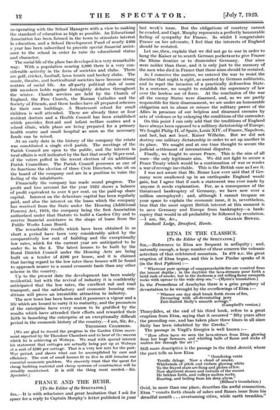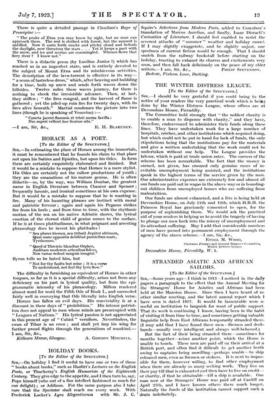ETNA IN THE CLASSICS.
[To the Editor of the SPECTATOR.] Sm,—References to Etna are frequent in antiquity ; and, naturally enough, a large number of these concern the volcanic activities of that celebrated mountain. In 479 B.C. the great eruption of Etna began, and this is how Pindar speaks of it (in the first Pythian) :— " ViThereout pure springs of unapproachable fire are vomited from the inmost depths ; in the daytime the lava-streams pour forth a lurid rush of smoke, but in the darkness a red rolling flame sweepeth rocks with uproar to the wide deep sea."--(111yers's translation.) In the Prometheus of Aeschylus there is a grim prophecy of devastation to be wrought by the overflovvings of Etna :— "Whence one day shall break forth rivers of fire, Devouring with all-devastating jaws Fair-fruited Sicily's smooth acreage."
(Campbell's version.) Thucydides, at the end of his third book, refers to a great eruption from Etna, saying that it occurred "fifty years after the preceding one, and has taken place three times in all since Sicily has been inhabited by the Greeks."
The passage in Virgil's Georgics is well known :— " How often have we seen the lava-stream from Etna glowing from her huge furnaces, and whirling balls of flame and rocks of molten fire through the air ! "
Still more descriptive is the passage in the third Aeneid, where
the poet tells us how Etna
"thundering vents
Terrific deluge. Now a cloud of smoke, Whirlwinds of pitch and embers glowing white
To the frayed stars are flung and globes of fire.
Now shattered stones and entrails of the mount He belches forth, and volleys molten rocks, Roaring, and boiling from his deep abyss." (Billson's translation.) Ovid, in more than one place, describes the awful commotion. Etna "vomits forth clouds of ashes and flames issue from his
dreadful mouth . . . overturning cities, while earth trembles." There is quite a detailed passage in Claudian's Rape of Proserpine :— " The peaks of Etna you may know by sight, but no man can approach them. The rest is clothed with forest, but the summit is unfilled. Now it casts forth smoke and pitchy cloud and befouls the daylight, now threatens the stars . . . Yet it keeps a pact with the snow, and ice and scoriae are commingled. Whence flows that fiery river ? I know not."
There is a didactic poem (by Lucilius Junior ?) which has reached us in an imperfect state, and is entirely devoted to the subject of Mount Etna and its mischievous activities. The description of the lava-torrent is effective in its way- " a scum of lustreless dross," which, after heaving and bubbling for a time, boils up anew and sends forth waves down the hillsides. Twelve miles these waves journey, for there is nothing to check the irresistible advance. Then, at last, they stiffen ; "the fires congeal, and the harvest of flame is gathered ; yet the piled-up ruin lies for twenty days, with its fires alive beneath." Martial condenses the picture into two lines (though he is speaking of Vesuvius) :— " Cuncta jacent flammis et tristi mersa favilla Nec superi vellent hoc licuisse sibi."















































 Previous page
Previous page